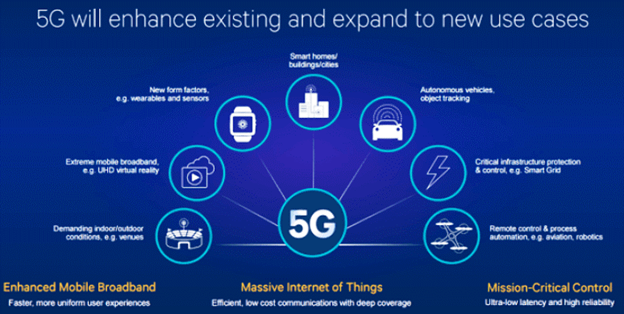Digital Insights
Your go-to source for the latest in technology and gadget reviews.
5G: The Invisible Backbone of Tomorrow's Tech
Discover how 5G is revolutionizing technology and shaping our future. Dive into the invisible backbone driving innovation today!
How 5G is Revolutionizing IoT: A Deep Dive
The rollout of 5G technology is setting the stage for a new era in the Internet of Things (IoT). With its significantly increased bandwidth and reduced latency, 5G enables billions of devices to connect and communicate seamlessly. This breakthrough allows for real-time data exchange, which is crucial for applications ranging from smart home devices to industrial automation. As a result, we are now seeing a surge in IoT innovations that leverage 5G networks, enhancing everything from remote diagnostics in healthcare to autonomous vehicle operation.
Moreover, 5G is not just about speed; it's also about supporting a higher density of connected devices. This is particularly essential as the number of IoT devices is expected to reach trillions in the coming years. Enhanced capacity and improved reliability mean that smart cities can implement advanced solutions such as real-time traffic monitoring and environmental sensors. By providing the infrastructure needed for these functionalities, 5G is truly revolutionizing the way we interact with technology, paving the way for an interconnected, intelligent future.

Understanding the Impact of 5G on Smart Cities and Infrastructure
The advent of 5G technology marks a pivotal moment in the evolution of smart cities, significantly enhancing connectivity and operational efficiency. With its promise of ultra-low latency and high-speed data transmission, 5G enables a multitude of IoT devices to communicate seamlessly. This connectivity supports real-time data collection and analysis, which is crucial for urban management. As cities integrate technologies such as intelligent traffic systems and smart utilities, the capability of 5G to handle massive data volumes becomes indispensable. Moreover, the increased bandwidth facilitates applications like remote health monitoring, energy management, and public safety systems, ultimately creating a more responsive urban environment.
In addition to improving existing infrastructures, 5G has the potential to revolutionize urban planning and development. By enabling advanced technologies such as autonomous vehicles and smart grids, 5G supports sustainable growth and resource management in smart cities. Key areas of impact include:
- Transportation: Enhanced vehicle-to-everything (V2X) communication helps reduce traffic congestion and improve public transport efficiency.
- Energy Management: Smart grids powered by 5G allow for real-time monitoring and distribution of energy resources.
- Public Safety: Integrated surveillance and emergency response systems can operate more effectively, improving overall city safety.
As these innovations unfold, the foundation for smart, resilient urban environments will be firmly established, reinforcing the significance of 5G technology in city infrastructure.
Is 5G Worth the Hype? Exploring its Real-World Applications
As we dive into the realm of 5G technology, it's essential to separate the hype from reality. Many tech enthusiasts tout 5G as a revolutionary advancement, promising lightning-fast internet speeds and unprecedented connectivity. But what does that mean in practical terms? For everyday users, the applications of 5G extend beyond just improved download times. One key benefit is the enhanced capacity for devices in crowded areas, such as stadiums and public events, allowing for seamless streaming and real-time data sharing. 5G's low latency also opens the door for innovations in areas like virtual and augmented reality, making immersive experiences more accessible and smooth.
Beyond entertainment, 5G is transforming various industries. For instance, in healthcare, the technology enables telemedicine services that can provide real-time consultations and remote surgeries, thereby bridging the gap between patients and specialists regardless of location. In the automotive sector, 5G is crucial for the development of autonomous vehicles, enabling them to communicate with each other and their environment, thus improving safety and efficiency on the roads. With these real-world applications, the question remains: is 5G worth the hype? As businesses and services continue to innovate and adapt, it seems that the benefits of 5G are just beginning to be realized.